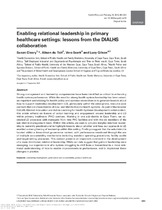| dc.contributor.author | Cleary, Susan | |
| dc.contributor.author | du Toit, Alison | |
| dc.contributor.author | Scott, Vera | |
| dc.contributor.author | Gilson, Lucy | |
| dc.date.accessioned | 2018-07-17T07:22:25Z | |
| dc.date.available | 2018-07-17T07:22:25Z | |
| dc.date.issued | 2018 | |
| dc.identifier.citation | Cleary, S. et al. (2018). Enabling relational leadership in primary healthcare settings: lessons from the DIALHS collaboration. Health Policy and Planning, 33: ii65–ii74 | en_US |
| dc.identifier.issn | 0268-1080 | |
| dc.identifier.uri | http://dx.doi.org/10.1093/heapol/czx135 | |
| dc.identifier.uri | http://hdl.handle.net/10566/3885 | |
| dc.description.abstract | Strong management and leadership competencies have been identified as critical in enhancing
health system performance. While the need for strong health system leadership has been raised,
an important undertaking for health policy and systems researchers is to generate lessons about
how to support leadership development (LD), particularly within the crisis-prone, resource poor
contexts that are characteristic of Low- and Middle-Income health systems. As part of the broader
DIALHS (District Innovation and Action Learning for Health Systems Development) collaboration,
this article reflects on 5 years of action learning and engagement around leadership and LD
within primary healthcare (PHC) services. Working in one sub-district in Cape Town, we cocreated
LD processes with managers from nine PHC facilities and with the six members of the
sub-district management team. Within this article, we seek to provide insights into how leadership
is currently practiced and to highlight lessons about whether and how our approach to LD
enabled a strengthening of leadership within this setting. Findings suggest that the sub-district is
located within a hierarchical governance context, with performance monitored through the use
of multiple accountability mechanisms including standard operating procedures, facility audits
and target setting processes. This context presents an important constraint to the development
of a more distributed, relational leadership. While our data suggest that gains in leadership were
emerging, our experience is of a system struggling to shift from a hierarchical to a more relational
understanding of how to enable improvements in performance, and to implement these
changes in practice. | en_US |
| dc.language.iso | en | en_US |
| dc.publisher | Oxford University Press | en_US |
| dc.rights | VC The Author(s) 2018. Published by Oxford University Press in association with The London School of Hygiene and Tropical Medicine.
This is an Open Access article distributed under the terms of the Creative Commons Attribution License (http://creativecommons.org/licenses/by/4.0/), which permits
unrestricted reuse, distribution, and reproduction in any medium, provided the original work is properly cited. | |
| dc.subject | Leadership development | en_US |
| dc.subject | Governance and accountability | en_US |
| dc.subject | Primary healthcare | en_US |
| dc.title | Enabling relational leadership in primary healthcare settings: lessons from the DIALHS collaboration | en_US |
| dc.type | Article | en_US |
| dc.privacy.showsubmitter | FALSE | |
| dc.status.ispeerreviewed | TRUE | |

